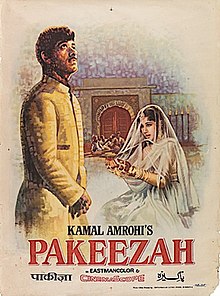
Back পাকিজা Bengali/Bangla Pakeezah German پاکیزه Persian Pakeezah Finnish Pakeezah French पाकीज़ा Hindi Pakeezah ID Pakeezah Italian 퓨어 하트 Korean Filem Pakeezah Malay
This article includes historical images which have been upscaled by an AI process. (March 2024) |
| Pakeezah | |
|---|---|
 Theatrical release poster | |
| Directed by | Kamal Amrohi |
| Written by | Kamal Amrohi |
| Produced by | Kamal Amrohi |
| Starring | |
| Cinematography | Josef Wirsching |
| Edited by | D. N. Pai |
| Music by | Songs: Ghulam Mohammed Naushad Score: Naushad |
Production companies |
|
Release date |
|
Running time | 147–175 minutes[a] |
| Country | India |
| Language | Hindustani |
| Budget | ₹12.5–15 million[4] |
| Box office | est. ₹60 million[5] |
Pakeezah (Hindustani pronunciation: [ˈpaːkiːzaː]; transl. The Pure One) is a 1972 Indian musical romantic drama written, directed, and produced by Kamal Amrohi. The film stars Meena Kumari as the eponymous lead, alongside Ashok Kumar and Raaj Kumar. It tells the story of Sahibjaan, a Lucknow-based tawaif. While asleep on a train, Sahibjaan receives a note from a stranger praising her beauty. Later, evacuating from a broken boat, she takes shelter in a tent and finds out its owner, a forest ranger named Salim, wrote the letter. Sahibjaan and Salim plan to get married, causing conflicts with Sahibjaan's professional background.
Amrohi, to whom Kumari was married, wanted to make a film dedicated to his wife; he began conceiving the story after the release of their collaborative film Daaera (1953). Production of the film lasted 15 years. Pakeezah's principal photography commenced in 1956 under the German cinematographer Josef Wirsching. The film faced many obstacles, particularly Kumari and Amrohi's separation in 1964 and Kumari's addiction to alcohol, which often made her unable to perform. After being postponed for many years, filming resumed in 1969 and finished in November 1971. The film's soundtrack, which became one of the highest-selling Bollywood soundtracks of the 1970s, was composed by Ghulam Mohammed and finished by Naushad, who also composed the background score.
Pakeezah, which was made on a budget of ₹12.5 million (US$150,000) to ₹15 million (US$180,000), premiered on 4 February 1972 and garnered a mixed response from critics. It was criticised for its extravagance and plot. Nevertheless, it emerged as the highest-grossing Hindi film of the year, grossing ₹60 million (US$720,000) after a theatrical run of over 50 weeks. Trade analysts said its popularity might have been due to Kumari's death a month after its release. The film earned her a then record-setting nomination for the Filmfare Award for Best Actress and won a Special Award at the Bengal Film Journalists' Association Awards; the film also received nominations for Best Film and Best Director (Amrohi), and won N. B. Kulkarni the Filmfare Award for Best Art Direction.
The film is known for its lengthy production time and is considered to be a milestone of the Muslim social genre. Although initial critical reception to the film was unfavourable, it greatly improved in the years after its release. The film earned widespread praise for its luxurious, sophisticated sets and costumes. Pakeezah is also known for being Meena Kumari's last film to be released during her lifetime; her performance in it has been regarded as one of the best of her career. Pakeezah has often been included in listings of the best works of Indian cinema, including a poll conducted by the British Film Institute in 2007.
Cite error: There are <ref group=lower-alpha> tags or {{efn}} templates on this page, but the references will not show without a {{reflist|group=lower-alpha}} template or {{notelist}} template (see the help page).
© MMXXIII Rich X Search. We shall prevail. All rights reserved. Rich X Search